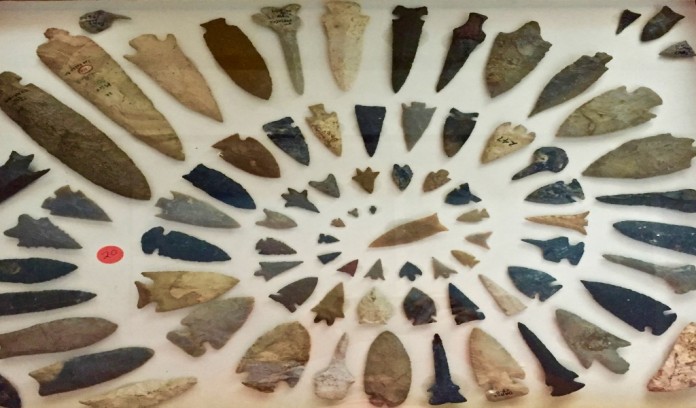“Treat the earth well. It was not given to you by your parents. It was loaned to you by your children. We do not inherit the Earth from our ancestors. We borrow it from our children.”
— Ancient Native American proverb
“Try to picture the man who carved this arrowhead, and then try to think of all the things it was used for,” my big sister said to me. I was never one bit good at finding arrowheads, but one of my sisters had the keen eye — as well as the heart — for finding those ancient keepsakes on the farms that raised us.
This was in the 1960s, prior to every field going no-till, when farmers plowed and worked the ground before planting. Dad would encourage us to see what we could find, letting us know when a particular field was prime for searching.
With a thermos of Kool-Aid and a sleeve of saltines, we would grab a sweatshirt and head for the hunt.
Unearthing treasure
There was one particular field where hunting arrowheads was nearly always successful. It was encircled by enormous trees, with a stream running through the eastern edge of it. It felt as though we were worlds away from the here and now. Just the setting alone helped paint the picture of days gone by, when creating tools from flint was required for survival.
When we finally sat in the shade after methodically walking the field, we would compare our treasure. If I was lucky, I had a few flint pieces to add to the stories we would envision.
My sister found the most perfect arrowhead any of us had ever spotted there. When she held it out for us to see, it covered nearly the full length of her outstretched hand. She said it was a knife, much sharper when first carved, and might have skinned squirrel or cleaned fish. It was like touching history, poking an otherwise remote connection, bringing it to life.
Some arrowheads we found were broken, or possibly scrapped for one reason or another before being finished. We found coal black flint as well as a light gray that sometimes appeared almost white after being washed.
Fanning a spark
History lessons began there, lighting a spark of interest that an assigned chapter of reading might have never accomplished. Born in it was a desire to know more about those who walked that very land before us.
Our great-uncle encouraged our curiosity, telling us to keep what we found, because it would grow more meaningful with time.
One day, he brought the biggest find of his lifetime, unearthed when a boy on the ancestral farm where our dad had been born. Enormous in my hands, it was a tomahawk, the one relic Dad had always dreamed of finding.
As his uncle told the story of how he had found it, we took turns holding it, feeling its weight, its perfection and smooth finish.
When it made its way back to our dad, his uncle said, “It’s yours now. I want you to have it.”
It was a sweet moment, and the memory of it remains clear and strong. Dad was clearly touched by the gesture, in disbelief of such a gift, proud to add it to the collection gathered over his lifetime.
Both of those good men are gone, and I thought of what each might have said to us as I read the following Native American proverb: “When the blood in your veins returns to the sea, and the earth in your bones returns to the ground, you will remember that this land does not belong to you. It is you who belong to this land.”














Great story,saw a guy sifting on the banks of Ohio River looking for arrowheads. Now I’m looking forward to finding my first one.
Pete, you might be interested in these tips on hunting for arrowheads in Ohio — https://www.farmanddairy.com/top-stories/how-to-hunt-for-arrowheads-in-ohio/564152.html. Happy hunting!
Great story, lots of artifacts found in fields, even gardens in Lorain, Medina counties. Fun hunting them.
Thanks for the articles on hunting for artifacts. I have dug some up in our own yard within city limits in Stark County. I shared about them on my blog: https://www.halloffamemoms.com/2020/10/homeschooling-and-finding-indian-artifacts-backyard-dig/
I do most of my hunting in Coshocton County and always find something – usually small stuff.